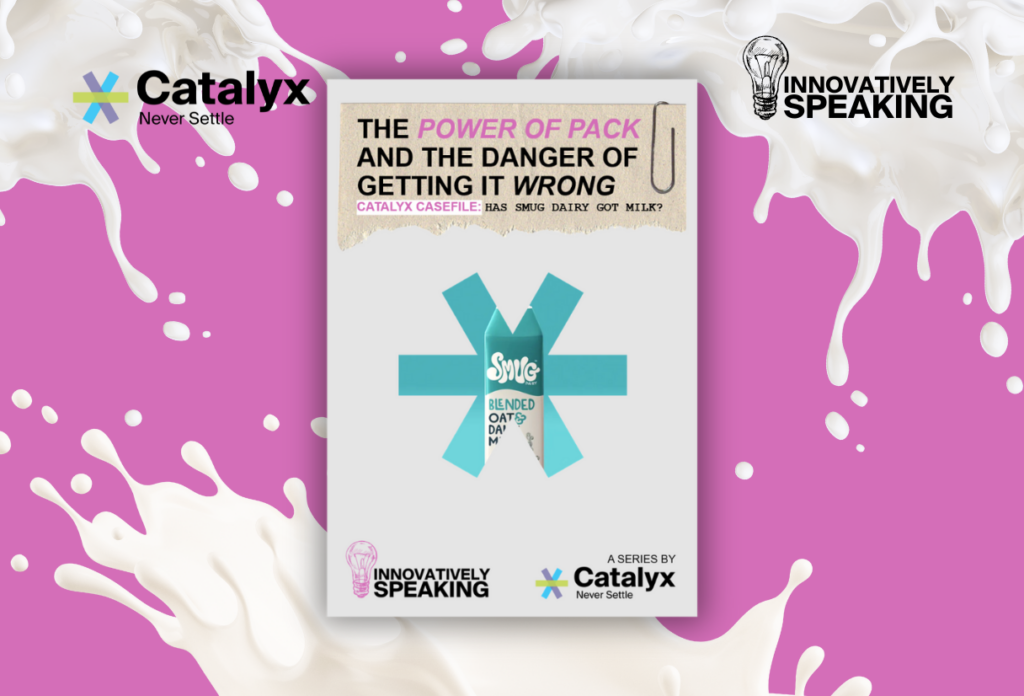Innovation is hard, especially when you overlook the importance of understanding consumer needs.
This is the central lesson from our new exploration of Smug Dairy’s new drink combining traditional dairy and oat milk. Despite its innovative concept and ability to make waves in the media, we found that Smug’s packaging has led to significant consumer confusion and some seriously mixed reactions.
To find out exactly what consumers thought of this innovation, we ran a research project and our Strategists elevated the findings as we would for any client. We tested Smug’s packaging with a group of 209 UK consumers, gathering thousands of data points. Initial impressions seemed positive, however, as we delved deeper, several critical issues emerged.
We decided to share a few of the most important headlines here. For a full view of the insights and actionable recommendations to develop winning packaging, download the full Catalyx Casefile.

1. Understanding consumer needs is vital for buy-in.
One of the main problems was that far too many consumers didn’t understand what the product was. A significant number of respondents were unsure about Smug’s nature, with some mistakenly believing it to be entirely dairy-free. This misunderstanding presents a legitimate health risk to anyone who is lactose-intolerant and is a deal-breaker for vegan consumers. Rooting your product in consumer needs is crucial for success – and part of that involves communicating to your consumer what the product actually is.
2. Smug faces the issue of a limited appeal.
At the time of our study, Smug had some shelf placement alongside fresh milk in supermarkets. This did not help its cause. Traditional milk-only consumers showed limited interest, largely due to the lack of clarity. Adoption of this new innovation is made even harder when placed up against the leading competitor.
3. What’s in a name? Some displeasure, apparently.
The name “Smug” also posed a problem. While it might seem clever from a marketing standpoint, it gave consumers a negative impression. Our deeper analysis showed that initial positive scores did not hold up when we examined the qualitative data. Consumers felt the name was off-putting and did not convey any meaningful information about the product, with many of these verbatims included in the Casefile.
4. Let’s get clear on the unclear benefits.
Perhaps the most glaring issue for the packaging was its failure to communicate key benefits. Smug combines the taste of milk with the health benefits of oat milk, but this selling point was not clearly highlighted. We know that 70% of decisions are based in emotional factors, according to research from Gallup. Emotional drivers like taste and health benefits were either buried in small print or not mentioned at all. For a product to stand out on the shelf, these benefits need to be front and centre.
5. Environmental impact made no impact with consumers.
Interestingly, the blend of dairy and oat milk significantly reduces emissions compared to traditional dairy. However, this important piece of information was hard to find on the packaging or in the advertising. In an age where sustainability is a major selling point, neglecting to highlight this is a missed opportunity.
6. Improving product development is absolutely possible.
To turn things around, Smug needs a packaging overhaul. The pack should clearly communicate why consumers should care about the product. Benefits like “High in taste, low in fat” should be prominently displayed to evoke an emotional response. Unless these aspects are communicated, Smug can’t win share and will face quick delists. We dived into some specific routes for success within the Casefile.
Download the full Catalyx Casefile
What you can take away from the Casefile
Packaging is the only element of the marketing mix that consumers are guaranteed to see. Ensure that the key benefits are prominently featured and resonate with consumer needs. Don’t just test claims; learn how consumers feel about them. Ask the deeper questions to understand the true motivations behind their choices.
At Catalyx, we specialise in Consumer-Centric Innovation. Your innovation is far more likely to fail than succeed without the right insights and strategies. Our approach ensures that you develop a product that not only meets consumer needs but also stands out in the market.
In the full report, we delve deeper into these findings and provide actionable recommendations for improving packaging effectiveness. Don’t miss out on the valuable insights that could transform your product’s market performance.

Make your innovation’s success predictable
We’re ready to unlock your innovation’s success, and won’t settle until our work does just that.
Don’t just take our word for it; check out our new website’s Case Studies to discover how our Qual at Quant scale approach has supercharged the success of innovations across industries.
Follow us on LinkedIn to make sure you never miss an announcement.
Let’s talk. Click here to innovate with confidence.
(Independent research conducted by Catalyx)






